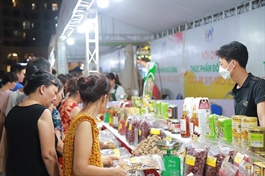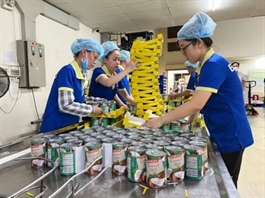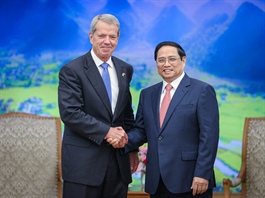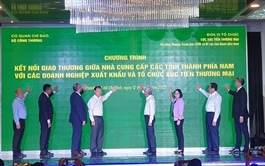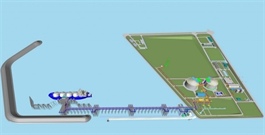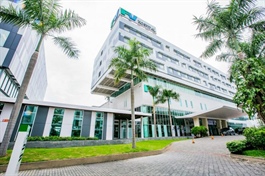Sustainable development – an indispensable choice for businesses
Sustainable development – an indispensable choice for businesses
Promoting the development of the circular economy is an indispensable choice for businesses to step closer to sustainability, attendees were told at a conference on sustainable development held in HCM City last week.
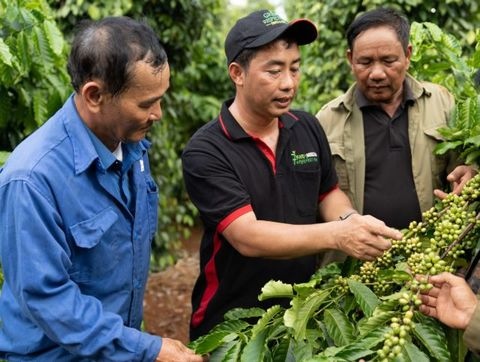
An employee of Nestlé Vietnam introduces sustainable farming methods to farmers in the Central Highland province of Đắk Lắk under their NESCAFÉ PLAN programme. — Photo courtesy of the firm |
The participants all agreed that the definition of business success has changed as society does not only look at economic indicators but also their contributions to environmental protection and the community's interests.
Nguyễn Quang Vinh, Vice chairman of the Việt Nam Chamber of Commerce and Industry (VCCI) cum chairman of Việt Nam Business Council for Sustainable Development (VBCSD) said traditional business or “business as usual” has no longer been an optimal choice. Instead, firms need to switch to a "nature-positive business model". This is a new concept that is receiving support from the global business community.
The "nature-positive business" is simply understood as a method that creates positive impacts on the natural environment, from which firms would help protect nature and contribute to climate change response. In addition, the business method would create long-term growth for companies themselves. Promoting the circular economy model, equitable energy transition, and cutting carbon emissions are all directions of firms that choose to do business in a socially and environmentally sustainable way.
“Enterprises in the world today are not only focusing on building and implementing sustainable development strategies within their businesses but also investing to increase participation and enhance capacity for suppliers and stakeholders in their value chain, thereby forming a sustainable ecosystem,” Vinh said.
He also pointed out new trends in the world business community, which have a strong impact on sustainable business practices, including smart transformation, value chain transformation, and promoting accountability and digital transformation to complement green transformation.
“The Vietnamese business community should pay attention and promptly grasp these trends to catch up with the international community,” he added.
“There is a close connection between circular economy implementation and carbon neutralisation goals and sustainable development,” said Assoc. Prof. Dr. Nguyễn Công Thành, Head of the Department of Economics - Natural Resources Management and Environment at the National Economics University.
Currently, 54 countries have been developing a national strategy or action plan to implement the circular economy. In Việt Nam, the circular economy and related issues such as waste separation at source, extended producer responsibility (EPR), green credit and green bonds have been included in the Law on Environmental Protection 2020.
“It is necessary to raise awareness about the important role of the circular economy for sustainable development to businesses and communities. People should be aware that the circular economy will help achieve many goals, such as better economic development, emission reduction, cost reduction for businesses, reduced costs for consumers, and job creation,” he said.
He added that the Government should improve effectiveness and remove policy and legal barriers; promote investment, association, cooperation and supervision in the implementation of the circular economy and promote innovation of circular economic models in production and consumption.
Firms join hands
Khuất Quang Hưng, Director of External Relations and Communication at Nestlé Vietnam said that the Vietnamese Government has many policies to promote green growth and sustainable development. However, it is necessary to concretise these policies to be suitable for each period and each situation.
“In order to deploy the circular economy, it is necessary to have specific solutions from the macro to the micro level, such as implementing incentives to promote green investment in agriculture; developing the legal framework, guidelines and regulations related to emission reduction throughout the value chain; establishing data systems, and auditing for emissions,” Hưng said.
Since 2015, all Nestlé Vietnam factories have achieved the goal of "No waste landfilled into the environment". Many initiatives of the circular economy model have been applied by the company to effectively use resources. The water treatment system has helped the company reuse 60-65 per cent of the total wastewater. Their waste, including coffee grounds, sand from boilers, and more are used to become green energy, or input materials for other products.
Nestle Vietnam has come up with a very unique and effective solution to reducing carbon emissions upstream in the supply chain.
“Nestle Vietnam has paid attention to suppliers, production, distribution, and packaging after use to implement the circular economy,” he added.
In particular, emissions from agricultural activities and input materials account for more than two-thirds of the group's total greenhouse gas emissions. It is the reason that Nestle Vietnam has focused on investing in reducing emissions from production. Accordingly, to reduce emissions upstream of the value chain, Nestlé Vietnam has implemented two strategic solutions: promoting regenerative agriculture and conserving and regenerating forests.
Its regenerative agriculture strategy has been concretised by the NESCAFÉ PLAN programme that has been implemented in the Central Highlands provinces since 2011. It has brought positive impacts on the environment and economic benefits for farmers in 16,000 households cultivating sustainable coffee according to 4C standards. Some 65 per cent of coffee gardens apply the model of intercropping and agroforestry, distributing more than 73 million high-quality seedlings to help replant more than 73,000ha of old coffee area (as of July 2023).
Nguyễn Thị Ngọc Huệ, Director of External Relations and Communication at AEON Việt Nam – one of the leading retailers in Việt Nam said: “Being aware of the importance of the circular economy, AEON Vietnam has accompanied consumers to help them change their perception of the role of environmental protection.”
For example, AEON Vietnam has limited use of plastic bags in their activities. In order to create a habit and help consumers get used to this programme, AEON Vietnam has designed an environmentally-friendly bag that meets the needs of shoppers, reduces prices, and is convenient. Since then, consumers have gradually abandoned the habit of using plastic bags.
Home Credit, one of the first foreign enterprises to provide consumer financial products in Việt Nam, is the pioneer in offering low-interest loan packages for instalment loans to buy electric motorbikes and household goods, especially those that are environmentally friendly.




